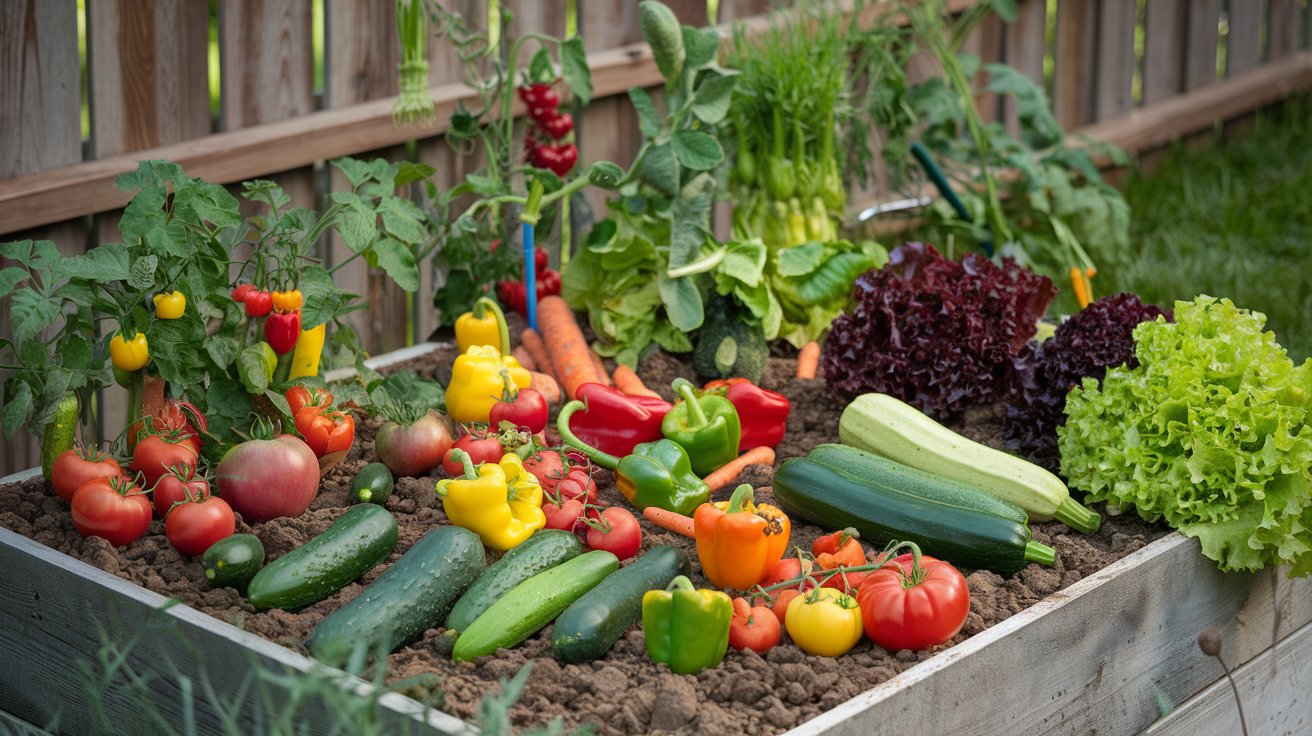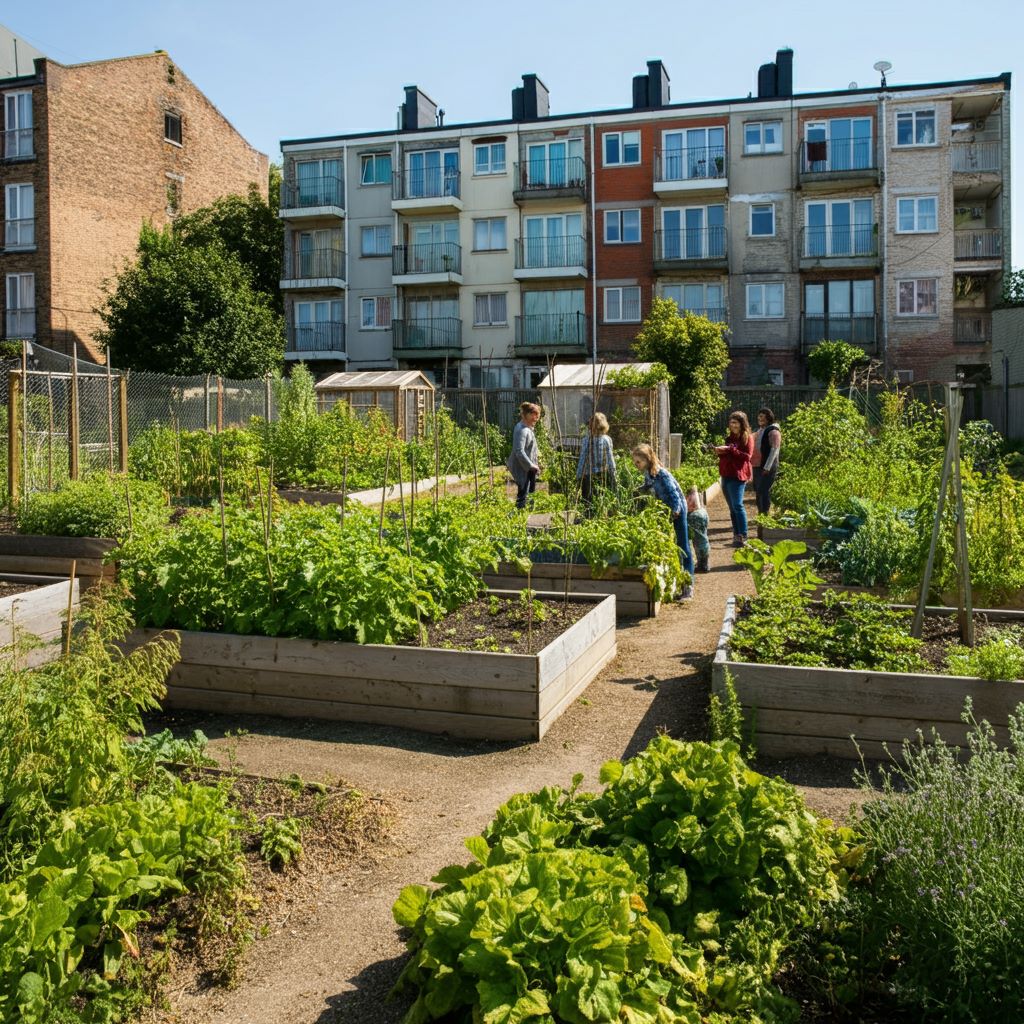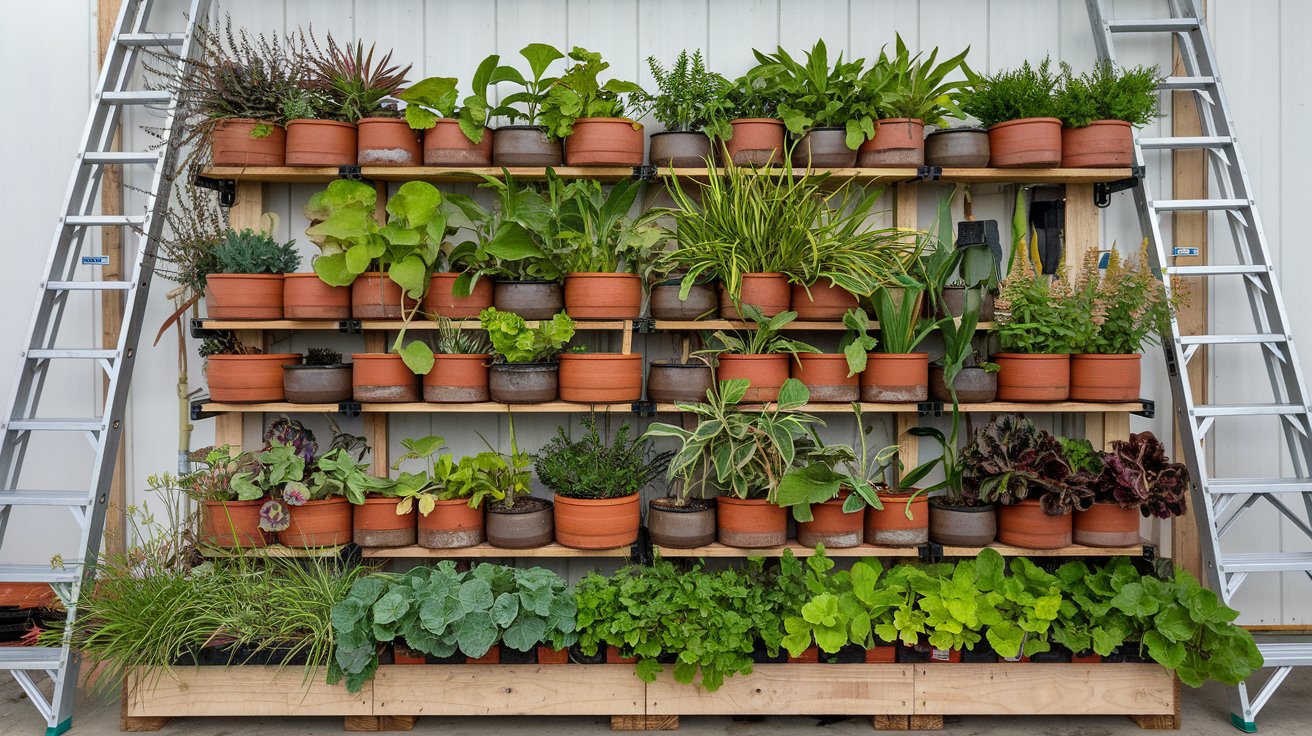Summer is synonymous with vibrant, sun-kissed garden vegetables that can take your meals to the next level. Imagine fresh tomatoes, crunchy cucumbers, and earthy zucchinis straight from your garden, all ready to become part of your summer feast. The beauty of growing your own vegetables lies not only in their unmatched flavor but also in their ability to provide wholesome, seasonal produce at your fingertips. Whether you’re an experienced gardener or a beginner, there’s a wide variety of garden vegetables that can thrive in the summer months, adding nutrition, color, and taste to your dishes.
By selecting the right vegetables, you’ll not only enhance your meals but also enjoy the satisfaction of growing them yourself. If you’re wondering which vegetables are best suited for your summer garden, you’ve come to the right place.
Key Takeaways
- Fresh, homegrown garden vegetables bring unmatched flavor and nutritional value.
- Many garden vegetables are easy to grow in the summer months with proper care.
- Seasonal produce is more sustainable, cost-effective, and provides higher quality.
- Garden vegetables such as tomatoes, cucumbers, and peppers are ideal for a summer feast.
- Incorporating garden vegetables into your meals enhances both taste and health benefits.
Table of Contents
Why Garden Vegetables Are Perfect for a Summer Feast
Garden vegetables are the perfect addition to any summer meal. Their freshness can significantly elevate the flavor profile of your dishes, making each bite more delicious. Whether it’s a vibrant salad, a hearty vegetable stir-fry, or roasted vegetable skewers, garden vegetables can add a burst of color, flavor, and texture that enhances the overall dining experience.
One of the biggest advantages of growing your own vegetables is the nutritional boost they provide. Unlike store-bought produce, which may lose some nutrients during transportation and storage, homegrown vegetables are harvested at their peak ripeness. This means they are packed with vitamins, minerals, and antioxidants that promote overall health. Additionally, growing your own vegetables allows you to avoid harmful pesticides and chemicals that are often used in commercial farming.
Another reason to opt for garden vegetables is sustainability. By growing your own produce, you reduce the need for packaged goods that contribute to plastic waste and carbon emissions. You’re also minimizing the distance your food travels, which in turn reduces its carbon footprint. Not only is this environmentally friendly, but it’s also cost-effective—by harvesting your own vegetables, you can save money at the grocery store.
Planning Your Summer Garden
Successful gardening starts with careful planning. Whether you have a large backyard garden or a small urban plot, knowing how to best use your space is key to growing a thriving garden. Start by considering the climate in your area—some vegetables, like tomatoes and peppers, require a lot of sunlight, while others, like lettuce, can tolerate partial shade.
Choosing the Right Garden Vegetables
Certain vegetables thrive during the warm summer months, and selecting varieties suited for your region ensures a successful harvest. Tomatoes, cucumbers, zucchinis, and peppers are all excellent summer vegetables to grow. If you’re new to gardening, these vegetables are forgiving and easy to care for.
Preparing Your Garden Bed
Prepare your soil well by adding compost and organic matter to enrich it. Good soil quality is essential for strong vegetable growth. You can also test the soil to check its pH and nutrient levels to ensure it meets the needs of your plants.
Companion Planting Tips
Companion planting is a gardening technique that helps improve the growth of your plants. By planting certain crops together, you can naturally deter pests, encourage pollination, and promote healthy growth. For example, basil planted near tomatoes can enhance their flavor and repel pests like mosquitoes. Similarly, marigolds are great for keeping harmful insects away from beans and peas.
Top Garden Vegetables for a Summer Feast
There are countless vegetables that can flourish in your summer garden, each bringing its own unique flavor and texture to your meals. Here are some of the best garden vegetables to grow for a delicious summer feast:
Tomatoes: The Star of Any Summer Meal
Tomatoes are the quintessential summer vegetable that steals the show in countless dishes. Whether you prefer the sweet and tangy cherry tomatoes or the meaty beefsteak variety, tomatoes are an essential addition to your garden. They grow best in full sun and require consistent watering. To get the most out of your tomato harvest, ensure they are planted in well-drained soil and spaced appropriately to prevent overcrowding.
Growing Tips for Tomatoes
- Choose disease-resistant varieties like Roma or Early Girl.
- Stake or cage tomato plants to support their growth and prevent them from sprawling on the ground.
- Water regularly to keep the soil evenly moist, but avoid overhead watering to prevent mildew.
Use in Summer Dishes
Fresh, homegrown tomatoes can be enjoyed in salads, on sandwiches, or in salsas. They are also perfect for making homemade pasta sauces, gazpacho, or even sun-dried tomatoes to store for later use.
Cucumbers: Refreshing and Crisp
Cucumbers are not only refreshing but also easy to grow, making them a perfect choice for a summer garden. They thrive in warm conditions and can be grown in both traditional garden beds and containers. The key to growing cucumbers successfully is ensuring they have plenty of water and space to sprawl, as their vines can take over large areas.
How to Grow Cucumbers
- Plant cucumber seeds after the last frost when the soil has warmed up.
- Ensure cucumbers receive full sunlight for at least 6–8 hours per day.
- Provide a trellis or fencing for vining varieties to grow vertically and save space.
Summer Recipes with Cucumbers
Cucumbers add a cool crunch to any dish, making them ideal for refreshing salads, pickles, or even smoothies. Try slicing them thinly for a cucumber salad with feta cheese and dill, or mix them into a chilled cucumber and yogurt soup.
Zucchini: A Versatile Vegetable
Zucchini is a garden superstar, known for its versatility and ease of growth. It can be grilled, sautéed, baked, or even made into noodles as a low-carb pasta alternative. Zucchini plants produce an abundance of fruit, so be prepared to harvest often. They thrive in warm soil and require plenty of space to grow.
How to Grow Zucchini
- Zucchini grows best in rich, well-drained soil and full sunlight.
- Water consistently, but avoid waterlogging the roots.
- Harvest zucchinis when they are small and tender for the best flavor.
Recipe Ideas for Zucchini
You can sauté zucchini with garlic and olive oil, make zucchini fritters, or stuff zucchini boats with a variety of fillings. Zucchini also shines in baked goods like bread or muffins.
Peppers: Sweet, Spicy, and Everything in Between
Peppers are a must-have for any summer garden, with a variety of sweet and hot options to choose from. Whether you enjoy bell peppers, jalapeños, or more exotic varieties, peppers bring color and heat to your meals. Peppers love warm weather and plenty of sunlight, so be sure to plant them in a sunny spot with good drainage.
Growing Tips for Peppers
- Start seeds indoors if you live in a cooler climate, and transplant them outdoors after the danger of frost has passed.
- Fertilize with balanced organic fertilizer to encourage healthy growth.
- Keep an eye out for pests like aphids and caterpillars, which can damage your pepper plants.
Using Peppers in Summer Dishes
Peppers are perfect for grilling, stuffing, or adding to salsas. They also pair well with tomatoes in summer pasta dishes or roasted alongside other vegetables for a colorful side dish.
Green Beans: Crunchy and Nutritious
Green beans are a staple in many summer gardens, known for their crisp texture and rich green color. They’re not only delicious but also a nutritious addition to your meals. Green beans grow best in warm soil, and they thrive when given enough space to spread out.
How to Grow Green Beans
- Plant beans in well-drained, fertile soil and ensure they have access to full sunlight.
- Choose pole beans for vertical growing or bush beans for compact spaces.
- Harvest beans regularly to encourage new growth.
Summer Recipes with Green Beans
Green beans are fantastic when sautéed with garlic and olive oil or roasted with herbs. They also shine in summer salads or as a simple side dish to complement grilled meats.
Herbs to Pair with Your Garden Vegetables
Herbs are a fantastic addition to your garden, as they not only enhance the flavor of your vegetables but also promote healthy growth. Pairing your vegetables with herbs like basil, parsley, and cilantro can take your summer meals to a whole new level.
- Basil is perfect with tomatoes, enhancing their natural sweetness in dishes like Caprese salad or pesto.
- Cilantro adds a bright, fresh flavor to cucumbers and peppers, and is essential in summer salsas.
- Parsley can complement green beans, zucchini, and a variety of other vegetables.
Planting Herbs with Your Vegetables
Planting herbs alongside vegetables also helps with pest control, as many herbs naturally repel insects. For example, planting basil near tomatoes can help keep aphids at bay, while rosemary can deter cabbage moths from cabbage and broccoli.
Maximizing Space in Smaller Gardens
Not everyone has a large backyard to dedicate to gardening, but that doesn’t mean you can’t enjoy a bountiful summer harvest. Even small urban spaces can accommodate a variety of garden vegetables, and there are several clever ways to maximize space.
- Vertical Gardening allows you to grow climbing plants like tomatoes, cucumbers, and beans on trellises or in hanging baskets.
- Container Gardening is ideal for herbs, peppers, and dwarf varieties of tomatoes. You can use anything from flower pots to repurposed containers.
- Raised Beds provide better soil drainage and allow you to grow more vegetables in a compact space.

How to Harvest Garden Vegetables at Their Peak
Harvesting your garden vegetables at just the right time is essential for both flavor and texture. Overripe vegetables can become tough and less flavorful, while under-ripe ones may not have reached their full potential.
- Tomatoes should be fully ripe, with a deep color and firmness.
- Cucumbers are best harvested when they are firm and bright green.
- Zucchini can be picked when small, typically 6-8 inches long.
- Green Beans should be tender and snap easily when bent.

Healthy and Delicious Summer Recipes with Garden Vegetables
When you’ve grown a bounty of fresh vegetables, the next step is transforming them into delightful meals. Here are a few recipes that showcase the best of your summer garden:
- Tomato and Cucumber Salad: A refreshing and easy-to-make salad featuring garden-fresh tomatoes and cucumbers, tossed with olive oil, lemon, and herbs like basil or parsley.
- Grilled Zucchini: Slice zucchini into thick rounds, drizzle with olive oil and garlic, then grill to perfection. Serve with a sprinkle of Parmesan for added flavor.
- Stuffed Bell Peppers: Hollow out peppers and fill them with a mix of quinoa, beans, and tomatoes for a healthy, colorful meal.
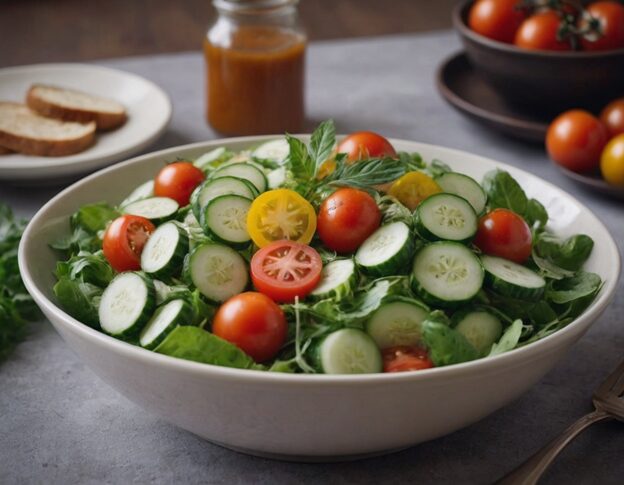
Creative Ways to Serve Garden Vegetables for a Feast
Your garden vegetables deserve a grand presentation. There are countless ways to creatively serve them, ensuring that your summer feast is as visually stunning as it is delicious.
- Roasted Vegetable Platters: Roast a variety of garden vegetables—like tomatoes, peppers, and zucchini—with olive oil and herbs. Arrange them on a large platter for a vibrant side dish.
- Grilled Vegetable Skewers: Thread vegetables like peppers, zucchini, and onions onto skewers and grill them for a smoky, charred flavor.
- Garden Vegetable Salsas and Dips: Combine fresh tomatoes, cucumbers, and peppers into a zesty salsa or blend them with Greek yogurt for a refreshing dip.
Nutritional Benefits of Summer Garden Vegetables
Aside from their fantastic flavors, summer garden vegetables offer a wide range of health benefits. They are packed with essential nutrients that promote overall health:
- Tomatoes are rich in lycopene, an antioxidant that supports heart health and reduces the risk of certain cancers.
- Cucumbers help with hydration, as they are made up of 95% water, making them an excellent choice for hot summer days.
- Zucchini is low in calories but high in vitamins A and C, which are important for skin health and immune function.
These garden vegetables not only taste great but also play an important role in supporting a healthy diet.
Conclusion: Enjoying a Delicious Summer Feast with Fresh Garden Vegetables
There’s no better way to celebrate the summer season than with a bounty of fresh garden vegetables. From tomatoes to cucumbers, zucchini, and peppers, these vegetables can be easily grown and used to create a variety of flavorful dishes. Growing your own vegetables not only provides you with nutrient-dense food but also contributes to a more sustainable lifestyle. So, get out there, plant your garden, and enjoy a delicious summer feast with homegrown produce!
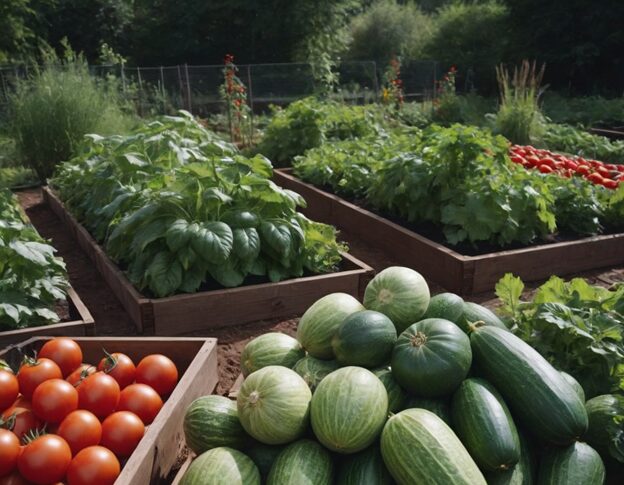
Frequently Asked Questions
What are the easiest garden vegetables to grow in summer?
Tomatoes, cucumbers, zucchini, and beans are among the easiest to grow in summer due to their adaptability and hardiness.
How can I maximize space for gardening in small areas?
Vertical gardening, container gardening, and raised beds are great solutions for making the most of limited gardening space.
What’s the best time to harvest tomatoes?
Harvest tomatoes when they are fully ripe, with a deep color and firm texture, typically in mid-summer.
Can I grow garden vegetables in pots?
Yes, many vegetables such as tomatoes, peppers, and herbs thrive in pots, making them ideal for small spaces like balconies and patios.
How do I prevent pests from damaging my garden vegetables?
Use natural pest control methods such as neem oil, introduce beneficial insects like ladybugs, and practice crop rotation to keep pests at bay.
Can I preserve my garden vegetables for later use?
Yes, you can preserve garden vegetables by freezing, canning, or drying them, allowing you to enjoy them even after the season ends.

Robert Martin is a passionate blogger and versatile content creator exploring the intersections of personal finance, technology, lifestyle, and culture. With a strong background in financial literacy and entrepreneurship, he helps readers make smarter money moves, build sustainable side hustles, and achieve financial independence.
Beyond finance, Robert shares his insights on home decor and gardening—offering practical ideas for creating beautiful, functional living spaces that inspire comfort and creativity. He also dives into the dynamic worlds of sports and celebrity news, blending entertainment with thoughtful commentary on trends that shape today’s pop culture.
From decoding the latest fintech innovations to spotlighting everyday success stories, Robert delivers content that’s informative, relatable, and actionable. His mission is to empower readers to live well-rounded, financially confident lives while staying inspired, informed, and ahead of the curve.


